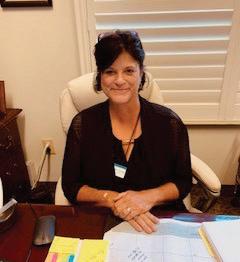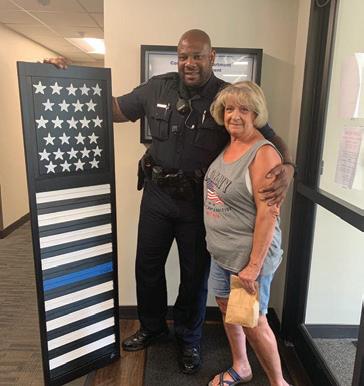
4 minute read
What Is Broadband?
by Diane Ciarloni | photos courtesy of Provided by City Managers
We live in a world of ultra-high technology. We use it every day. We use it at work. We use it at home. We use it to clean and to eat and to play and to travel. Empires such as Amazon are built on technology. Some of us aren’t tuned in to just how much we do use it, while others of us are amazed that we can use it since we define ourselves as technologically illiterate.
Advertisement
Anyone doubting our legitimate, deepseated need for all this technology became a believer when COVID-19 rolled across us. Computers. Cell phones. Zoom meetings. Wi-Fi. Everything combined allowed us to function. Our children learned online. We shopped online. We met with our medical doctors online. Technology kept us breathing.
Computers were around decades before the advent of the mind-boggling information highway known as the World Wide Web (www). Billions of people wanted to drive on it, to have knowledge with no more effort than tapping words on a keyboard. We all became instant geniuses as soon as we hooked up to the wizard known as Google.
Something known as “dial-up” became available to businesses and homes. Computers hooked to phone lines. We dialed a number and waited for a few (or several) minutes for a connection. Sometimes, though, the connection was destroyed by an incoming or outgoing phone call. Fixing the problem meant installing a separate telephone line, dedicated exclusively to use of the Internet.
Our desks became cluttered with computers, monitors, modems and routers. Some of us didn’t know what those things did, but we knew we needed them if we intended to stay in touch with Google.
People such as Bill Gates, Steve Jobs and Mark Zuckerberg were driven to make things better and better. The mixed blessing of social media emerged. Then, one morning, we woke up to something called Broadband.
Broadband literally made the Internet what it is today. No more dial-up. No more waiting. No more extra phone line. Use the telephone and Internet simultaneously, if you want. A new world opened.
Wendy Withers

Basically, broadband is a high-speed link from an office, school, home or wherever directly to the Internet. It’s always on. It’s fast and millions of “messages” can be sent to it, and through it, at the same time. Broadband can be provided by telephone or cable companies, cell phone companies or satellite. Generally, telephone and cable are the most reliable.
Bandwidth is another term associated with broadband, but it has nothing to do with Internet speed. Instead, it refers to the maximum amount of data that can travel over an Internet connection in a given amount of time.
Available access to all this critical technology is not always equal, which concerns the leaders of the four Lake Cities – Corinth, Lake Dallas, Hickory Creek and Shady Shores. Currently, it’s not that uncommon for areas within the boundaries of those cities to have no broadband access. The best they can do is dial-up, which is especially unacceptable for businesses.
The city managers/administrators came together and formed the Lake Cities Broadband Commission: Bob Hart of Corinth, John Cabrales, Jr. of Lake Dallas, John Smith of Hickory Creek and Wendy Withers of Shady Shores. They discussed and they investigated paths to make reliable broadband available to the entire population at competitive pricing.

John Smith
Research led them to Connected Nation Texas’ “Connected Community” program. The company’s references include working with the Texas Department of Agriculture. The first step for Connected Nation was to assess the present status of broadband in the area and formulate a plan to satisfy present and future needs.
There are two primary factors at stake. “We’re concerned with availability and speed,” noted Smith. “We also want more than one provider, which would give us the option to choose.”
Many small businesses in the Lake Cities were hit hard by pandemic closures. Some cut their losses significantly by taking full advantage of the Internet.
“Having widespread broadband is critical for our cities’ forward progress. Many businesses won’t consider locating where there is no reliable broadband. Because of COVID-19, the number of home offices has increased tremendously. Broadband is equally important to them,” commented Cabrales. As a matter of fact, there are no exceptions; if you’re bringing the Internet into your business, home or school, available broadband through a selection of reputable providers is a must.
“Connected Nation has completed several steps,” commented Hart. “We already have many areas with broadband but it’s through older equipment, with a single provider. The plan calls for those areas to be updated for maximum speed. All infrastructure has been evaluated.” All the paperwork, studies, surveys, discussions and endless meetings will be close to completion by February. “There should be a workable plan in place by then,” said Withers. “At that point, it’s time to get the money.”
Oh. Yes. Money.
“There are federal dollars out there for these kinds of projects. It’s a matter of showing the worthiness of our plan in a grant application,” explained Cabrales.
All four cities have past successes in obtaining grant money. There’s no reason to think that same success wouldn’t apply to the quest for broadband. Also, the joining forces of the four makes them even more attractive.
It won’t be too long before we know and, hopefully, those still suffering through the inconvenience of dial-up will enjoy the smooth, rapid transmission of unlimited data from the World Wide Web via broadband. It’s time for an uninterrupted drive on that information highway.

John Cabrales, Jr.











